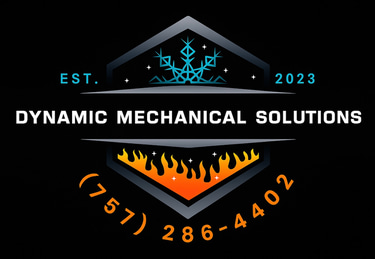How Weather Impacts Your HVAC System


As HVAC professionals serving the Hampton Roads region, we see firsthand how our unique coastal climate affects heating and cooling systems. From sweltering summers to damp winters—and everything in between—weather in this part of Virginia can take a toll on your HVAC system in ways you might not realize.
Whether you live in Chesapeake, Virginia Beach, Norfolk, or any of the surrounding cities, your system is exposed to more than just temperature changes. Humidity, salt air, and seasonal storms all influence how your HVAC performs, how long it lasts, and how much it costs to operate.
In this article, we’ll break down exactly how Hampton Roads weather impacts your HVAC system—and what you can do to keep it running efficiently year-round.
1. High Humidity Wears on Components
If you’ve spent even one summer in Hampton Roads, you know humidity here is no joke. While your air conditioner is designed to help control indoor humidity, excessive moisture in the air puts extra strain on your system.
What happens: Humidity causes your system to work harder to remove moisture from the air. This constant load can shorten the life of your compressor, increase energy consumption, and lead to moisture buildup in ductwork and internal components.
What you can do:
Schedule regular maintenance to keep coils and drains clean.
Use a whole-home dehumidifier if humidity stays consistently high indoors.
Make sure your system is properly sized. Oversized units cycle too quickly and don’t dehumidify efficiently.
2. Salt Air Accelerates Corrosion
Being close to the Atlantic Ocean has its perks—but salty air is not one of them when it comes to HVAC systems. Even if you’re several miles inland, salt in the atmosphere can gradually corrode your outdoor condenser unit.
What happens: Salt particles settle on the metal fins and coils of your outdoor unit, accelerating rust and corrosion. This can weaken your system’s efficiency and lead to refrigerant leaks or coil failure over time.
What you can do:
Rinse your outdoor unit with a hose every few months to remove salt buildup (especially in spring and summer).
Ask your technician about anti-corrosion coatings during your next maintenance visit.
Consider a coastal-grade unit designed to withstand salty environments.
3. Temperature Swings Can Stress Your System
In Hampton Roads, we can experience 40-degree mornings followed by 75-degree afternoons—especially during spring and fall. These rapid swings in temperature can confuse older thermostats and cause your system to cycle more frequently than necessary.
What happens: Frequent on-and-off cycling increases wear on parts like capacitors, contactors, and motors. It can also lead to uneven temperatures throughout your home, causing discomfort and wasted energy.
What you can do:
Upgrade to a smart or programmable thermostat that adapts to changing conditions.
Insulate your home well to reduce heat gain and loss during transitions.
Have your HVAC technician check for short cycling during seasonal tune-ups.
4. Storms and Hurricanes Pose Serious Risk
Our region isn’t a stranger to tropical storms and the occasional hurricane. These weather events can bring wind-driven debris, power outages, and flooding—all of which can damage HVAC equipment.
What happens: Outdoor units can be dented or clogged by flying debris. Flooding can damage electrical components or the compressor. Power surges during outages can fry sensitive circuitry inside your system.
What you can do:
Anchor your condenser unit and install a protective cover before major storms.
Elevate your outdoor unit if you live in a flood-prone area.
Invest in a surge protector or whole-home generator to protect HVAC electronics.
5. Winter Dampness Overheats Heat Pumps
Unlike in northern climates, most Hampton Roads homes use heat pumps rather than furnaces. Heat pumps are efficient, but they can struggle in damp, chilly conditions—especially when temperatures hover around freezing.
What happens: In wet winter weather, your outdoor coil can freeze over. While systems are designed to defrost, frequent freezing can lead to long run times, reduced heat output, or emergency heat activation—which is costly.
What you can do:
Schedule pre-winter maintenance to ensure your defrost cycle is working properly.
Keep the area around the outdoor unit clear of leaves and debris.
Consider a dual-fuel system if you frequently rely on backup heat.
6. Pollen and Debris Impact Indoor Air Quality
Spring in Hampton Roads brings a thick layer of yellow-green pollen that covers everything—including your HVAC equipment. Combined with mold spores and leaf debris, this can significantly reduce your system’s airflow and filter efficiency.
What happens: Clogged filters and dirty coils reduce airflow, overwork your blower motor, and lead to poor indoor air quality. If allergens are trapped indoors, they can recirculate through your ductwork and aggravate allergy symptoms.
What you can do:
Change your air filters monthly during spring and summer.
Consider a HEPA-grade filter or air purifier for homes with allergies or asthma.
Schedule duct cleaning if your home hasn’t had one in several years.
Final Thoughts: Stay Ahead of the Weather with Regular Maintenance
Weather in Hampton Roads is unpredictable—but your comfort doesn’t have to be. Understanding how our local climate affects your HVAC system is the first step toward protecting your investment and ensuring year-round comfort.
The best thing you can do? Schedule biannual maintenance—once before cooling season and once before heating season. Regular tune-ups help identify weather-related wear early, keep your system efficient, and reduce the risk of costly breakdowns.
If you’re noticing unusual HVAC behavior or just want to prepare your system for the next season, reach out to your local HVAC professionals. We know how to build systems that stand up to everything Hampton Roads weather throws at them—and we’re here to help.




